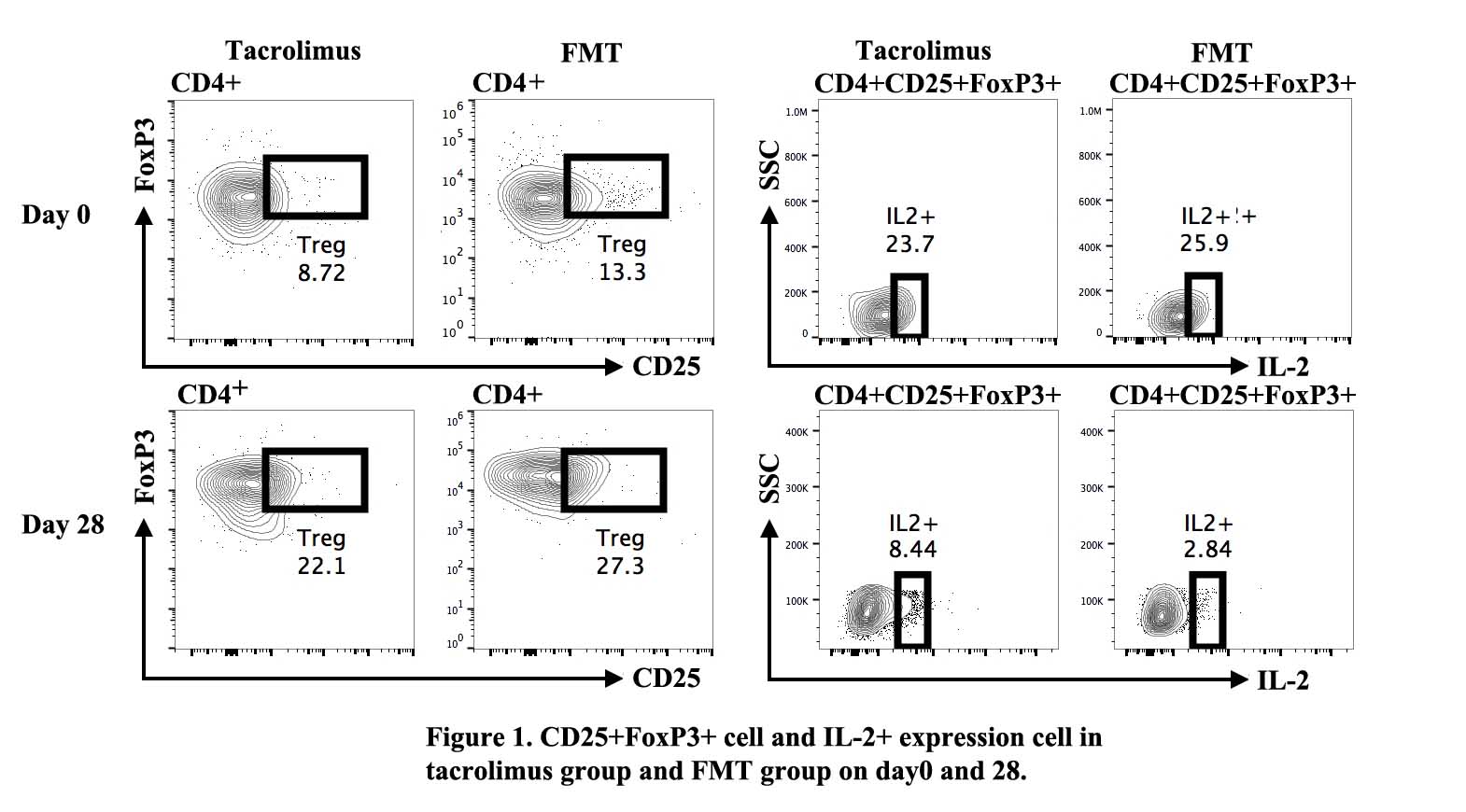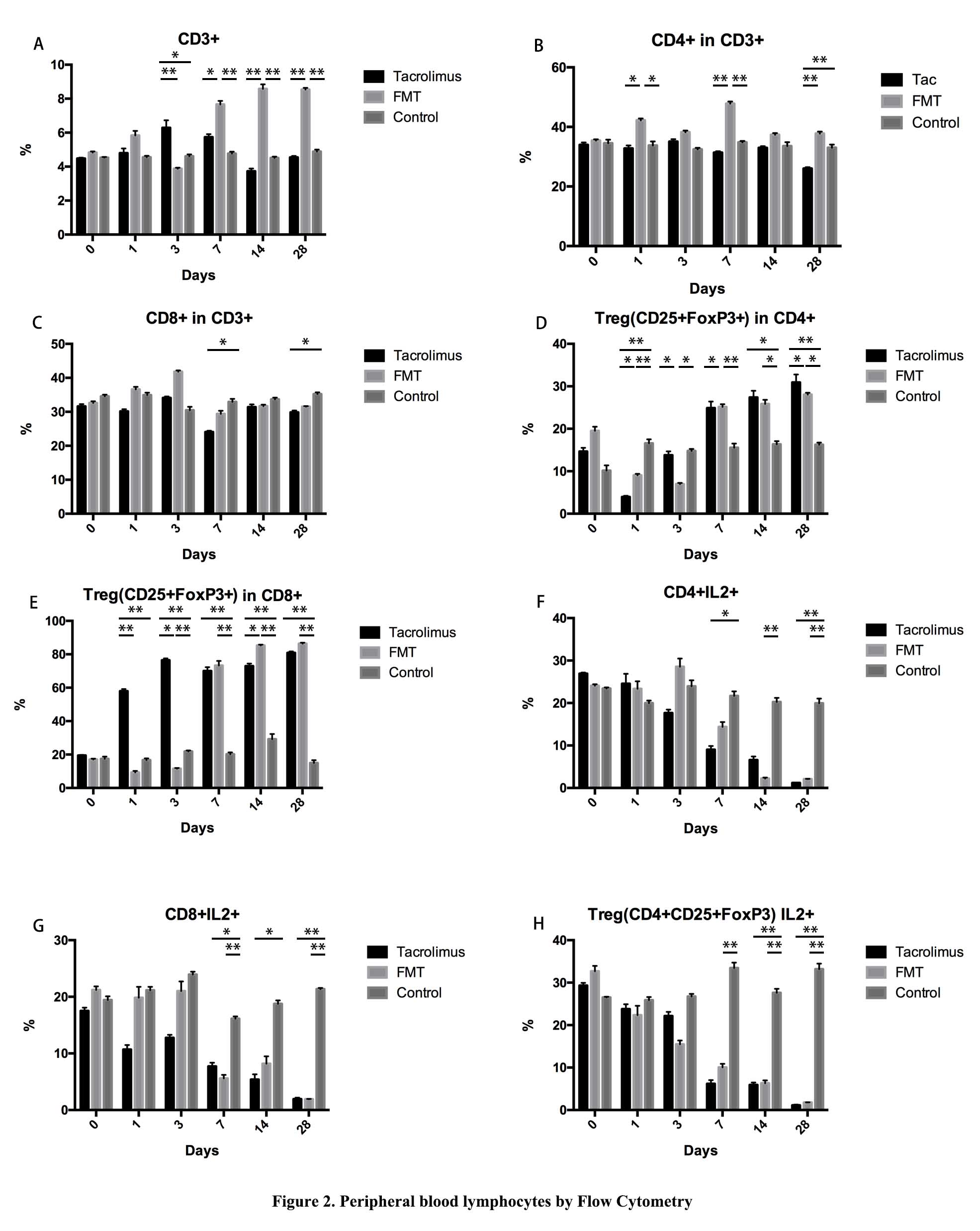Immunosuppressive Treatment Alters Gut Microbiota and Modified Gut Microbiota Affects Immune Status.
Department of Urology, Beijing Chaoyang Hospital, CCMU, Beijing, China
Meeting: 2017 American Transplant Congress
Abstract number: A138
Keywords: FACS analysis, FK506, Immunosuppression, Lymphocytes
Session Information
Session Name: Poster Session A: Immunosuppression
Session Type: Poster Session
Date: Saturday, April 29, 2017
Session Time: 5:30pm-7:30pm
 Presentation Time: 5:30pm-7:30pm
Presentation Time: 5:30pm-7:30pm
Location: Hall D1
Objectives: Immunosuppressive therapies could change the host-microbial interactions, especially gut microbiota, which is an important component in systemic immunity. We evaluated the relationship between immunosuppression and gut microbiota, to investigate the immune function by fecal microbiota transplantation in mice models.
Materials and Methods: Mice models were established using C57BL6 mice. Tacrolimus was used to establish immunosuppressive model in mice. Tacrolimus group(T group)(n=8) was given 10mg/kg of tacrolimus by gavage each day; fecal microbiota transplantation group(F group)(n=8) was given fresh feces from T group (500mg resuspended in 150 ml of sterile water, no tacrolimus left); control group(C group)(n=5) transplanted fresh feces from blank mice. On 0 to 28 days, flow cytometry was used to characterize peripheral blood lymphocytes expressing CD3, CD4, CD8, CD25, Foxp3, IL-2. On 3, 7, 14 day, gut microbiota was analyzed by 16S rRNA gene sequencing.
Results: Relative abundance of proteobacteria showed significant differences between T group and C group after 3 days(P<0.05, Wilcoxon signed-rank test) (Figure is about to finish). Comparing with T group, F group had no differences on gut microbiota after 7 days(P=0.38), and blood tacrolimus level is below detection limit. The percentage of Treg cell was significantly increased in both groups, T group has higher percentage and earlier increase than F group. Both group has lower IL-2 expression in many type of T cells.
 Conclusion: Based on these findings, the gut microbiota could be changed by systemic immune status, such as immunosuppressive therapies, and modifications of gut microbiota is considered to affect the immune status. A specific composition of gut microbiota may be able to induce immunosuppressive state or strengthen the effect of immunosuppressive agents.
Conclusion: Based on these findings, the gut microbiota could be changed by systemic immune status, such as immunosuppressive therapies, and modifications of gut microbiota is considered to affect the immune status. A specific composition of gut microbiota may be able to induce immunosuppressive state or strengthen the effect of immunosuppressive agents.
CITATION INFORMATION: Zhang Z, Xu Y, Zhang Q, Hu X. Immunosuppressive Treatment Alters Gut Microbiota and Modified Gut Microbiota Affects Immune Status. Am J Transplant. 2017;17 (suppl 3).
To cite this abstract in AMA style:
Zhang Z, Xu Y, Zhang Q, Hu X. Immunosuppressive Treatment Alters Gut Microbiota and Modified Gut Microbiota Affects Immune Status. [abstract]. Am J Transplant. 2017; 17 (suppl 3). https://atcmeetingabstracts.com/abstract/immunosuppressive-treatment-alters-gut-microbiota-and-modified-gut-microbiota-affects-immune-status/. Accessed February 25, 2026.« Back to 2017 American Transplant Congress
